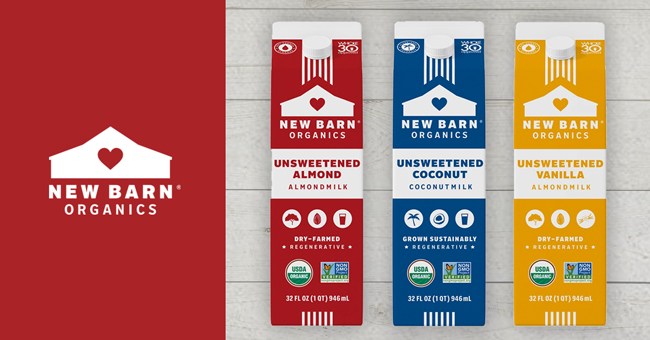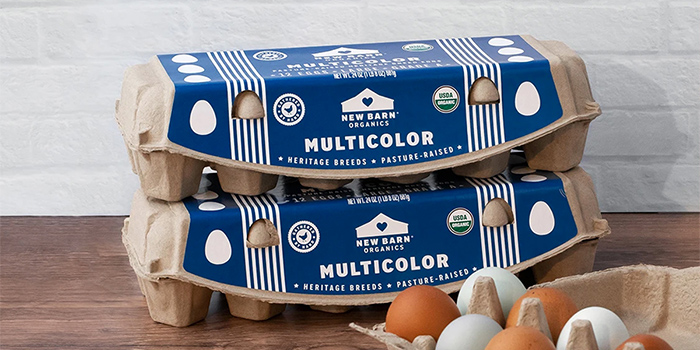In June, plant-based food and beverage brand New Barn Organics was acquired by national egg producer NestFresh in a move that promised to allow both companies to provide a broader range of products and give the brand a new runway for growth. Nearly three months later, that promise is taking shape.
Now with the entire portfolio sporting refreshed packaging featuring bright primary colors intended to help the brand pop on shelf, New Barn is aiming to expand nationwide as a kitchen essentials platform in the curious position of selling both vegan milks and animal-based foods, via an egg line, with new innovations expected to fill out its offerings in the coming months.
Speaking to BevNET, Hannah Youngblood, sales coordinator at New Barn, noted that while the brand has faced challenges in the past, its integration into the NestFresh system is poised to support the brand via its robust nationwide operations.
The acquisition involved an unusual structure: NestFresh purchased all assets of New Barn including the brand and products, but the company’s existing shareholders still retain ownership. NestFresh now pays royalties for every product sold and if the brand is ever sold again shareholders will then see returns. Despite this structure, Youngblood said New Barn’s operations have now been entirely folded into NestFresh, giving the smaller company access to its full network of sales, marketing and supply chain support.
At the time of the sale, New Barn was a smaller player in the plant-based milk category. According to IRI, in the 52-week period ending June 13, New Barn’s ready-to-drink almond milks were down -35.7% to $150,000 in sales, while additional milks classified as refrigerated fell -61.1% to $66,100. While the data shows only a limited selection of the brand’s sales, the company had struggled to find its footing in recent years, including a move in 2019 to drop several product lines and scale back its retail footprint to 3,000 stores on the West Coast.
The goal of New Barn’s refreshed branding, Youngblood said, is to simplify its messaging through a color code system (Coconutmilk is blue, Almondmilk is red, etc.) to help the products pop on shelf and reduce consumer confusion. Though the core brand identifiers are still there, certain tweaks have been made: for one, the barn silhouette in the logo now features a heart. The new 32 oz. cartons also include new callouts, such as the Whole30 Approved badge, non-GMO Project verified and a symbol noting the products use sustainably sourced, dry-farmed almonds.
“When we were thinking about it and brainstorming, we really wanted shoppers to have an almost nostalgic feeling of pulling from a crayon box when they’re going to pick up their product from the shelf,” Youngblood said.
The design was developed by New Barn co-founder Kerry Robb, who shared on LinkedIn last week that the front-of-pack white band “visually widens the carton” — a response, she wrote, to consumers who felt the carton looked “overly thin” on shelf.
Now, NestFresh is looking at how to best expand New Barn’s portfolio under a cohesive vision after several years of cycling through innovations including flavored almond milks, cold brew coffees, vegan dips and frozen dairy desserts.
The plant-based milk lineup currently features Coconutmilk, Almondmilk and Vanilla Almondmilk (all unsweetened) as well as a non-organic Barista Blend, which will see an organic upgrade rolling out in the near future. Last year, New Barn also launched a line of eggs, initially supplied by NestFresh prior to the deal, in Multicolored and Pasture Raised varieties. Sold in one dozen cartons, the eggs perhaps best reflect the intertwined nature of New Barn and NestFresh and present an opportunity for New Barn to expand further into premium animal-based products.
According to Youngblood, the brand is aiming to appeal to flexitarian consumers who prefer plant-based milks but still consume some animal products, with a long term goal of transitioning into a platform brand focused on pantry staples. While the breakfast occasion is the most common day-to-day use for the portfolio, Youngblood added that the products will also be designed with cooking and anytime use in mind.
“What we learned is that a lot of our fans are flexible in their eating habits,” she said. “And so by incorporating the eggs into the brand, we’re focused on making the staple foods that people actually eat. So that’s almond milk for your cereal, butter for your toast, creamers for your coffee — all things that we eat in the morning — and we really felt that eggs were a perfect addition to our lineup.”
While plant-based butters are not currently listed on New Barn’s website, despite previously being sold, Youngblood said the category is among the focuses for the revamped brand alongside milk and eggs. According to NestFresh marketing manager Sotheary Hom, the company is also developing several new innovations with broad line expansion plans, including new flavors, seasonal holiday items (hinting at an “egg and almond milk” product), grab-and-go beverages and other products tailored to lactose intolerant consumers.
“I think the strategy going forward is we really want to focus on R&D and get feedback from customers to see what the next big item might be,” Hom said. “So we’re really taking a different approach on launching new items.”
Today, Youngblood said the West Coast remains the brand’s strongest market but the goal is to now bring the products nationwide again. The brand has already rolled out into New England and into Hawaii, with the natural and specialty channel remaining the focus including retailers like Whole Foods, Mother’s Markets and Erewhon.
NestFresh operates distribution centers throughout the country that allows New Barn to go direct to many of its retailers and the brand is also distributed through some DSD partners and UNFI and KeHE, Youngblood said. New Barn’s milks are also sold direct-to-consumer online which has helped to grow the brand in the middle of the country.
“I would say that we’re really committed to partnering with retailers who will support an opportunity to grow in new markets and can be essentially anchor retailers for us in those new markets,” Youngblood said.

